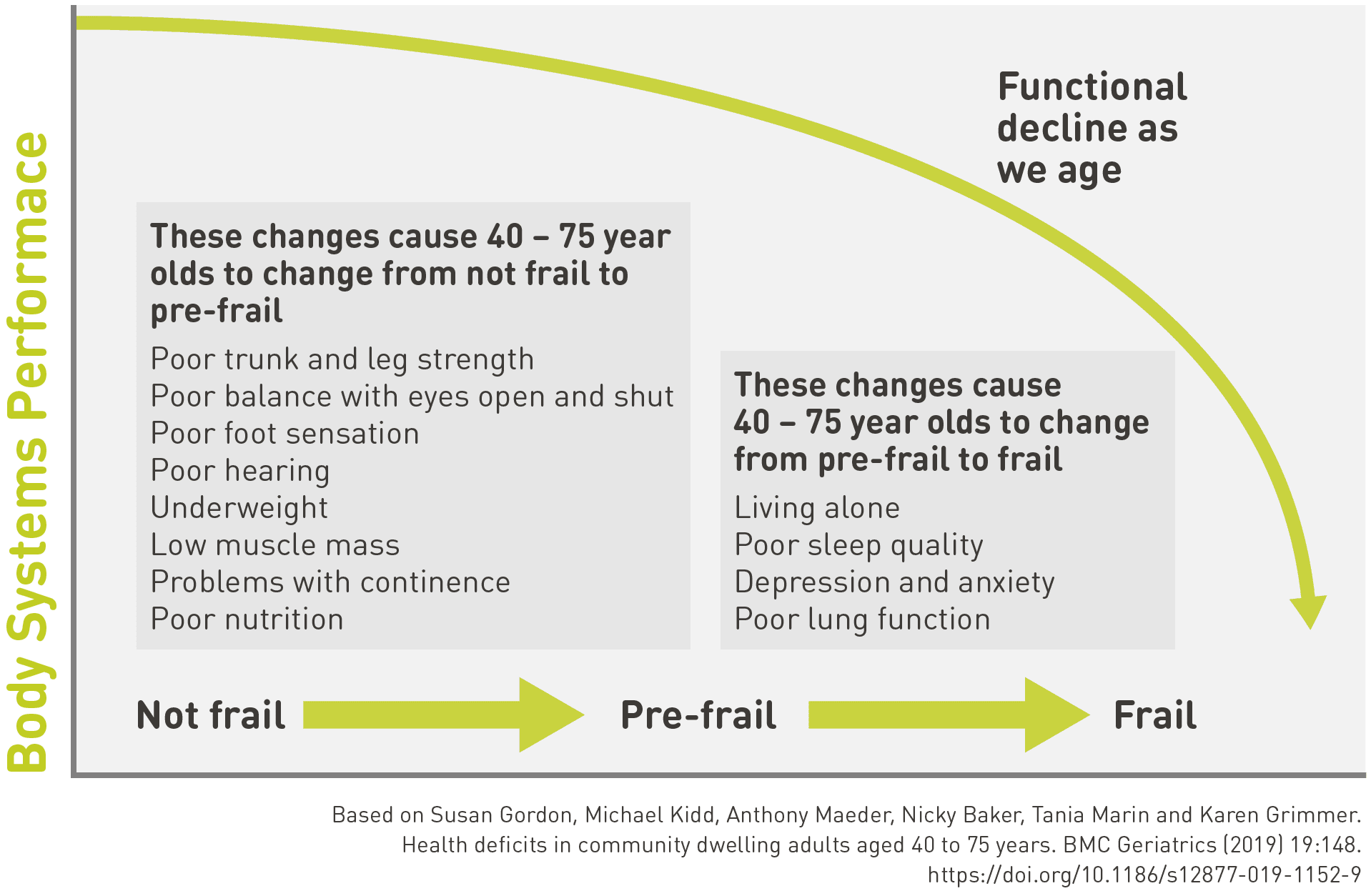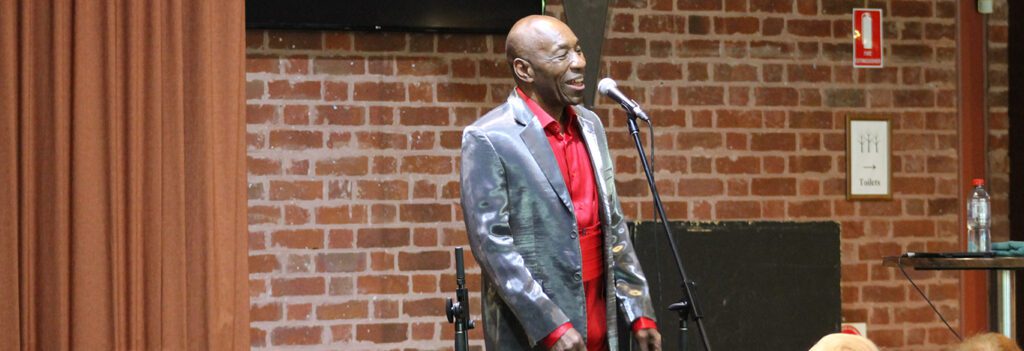Growing older is a given, but becoming frail should not be. Staying healthy and feeling our best as we age is important. While most people assume that becoming frail is something that happens later in life new research has shown that it starts as early as 40.
What does frailty mean?

Frailty is a broad term that describes a reduction in health, energy levels or cognition resulting in illness or a decline in physical or cognition functions. It is preceded by pre-frailty.
Signs of pre-frailty and frailty include unintentional weight loss, exhaustion, low physical activity, weak grip strength and slow walking speed. Frailty results in higher risk of disability, falls, dementia, and premature death.
Recent research by Flinders University explored pre-frailty and frailty in independent community-dwelling adults between the age of 40 to 75. The research studied a group of 656 volunteers (67% female) aged 40 to 75 years from different locations in Adelaide.
59.2% of participants were classified as not frail and 39% pre-frail with 1.8% frail. It didn’t matter what your age or gender was you were equally likely to be pre-frail. For instance, 45% of people aged 40-49 were pre-frail the same percentage as people aged 70-75. This shows us the importance of healthy ageing and reminds us that interventions to prevent the onset of pre-frailty and progression to frailty should start as early as 40.
What causes pre-frailty?

The things that are different between people who are not frail and pre-frail are shown on the chart above. They include decreased or poor trunk and leg strength, balance, hearing, foot sensation, continence and nutrition. By identifying and understanding the presence of one or more of these pre-frail attributes, people can address them and reduce the risk of pre-frailty. Things like improving physical strength, control and coordination, and exercises to improve balance, exercises and programs to maintain continence and advice about good nutrition and access to healthy food options.
The things that are different between people who are pre-frail and frail are also shown on the chart. They include poor sleep quality, living alone, depression and anxiety, and poor lung function. Some of these factors can also be addressed to decrease frailty.
Tips to avoid pre-frailty
Often, we don’t know notice the little changes in balance, hearing and these other things that cause us to become pre-frail. So have an assessment to see if you have changes that you are unaware of that are increasing your risk of becoming pre-frail and frail.
Check your balance – can you stand on one leg with your eyes open for 5 seconds without wobbling or having to place both feet on the ground? Can you do it on your left leg and your right leg? If that’s OK can you stand on one leg with your eyes closed? If you can’t then you need to do something about your balance.
Poor muscle control and coordination can cause poor balance. Simple graduated exercises are available from your physiotherapist that can help. But poor balance can be also be related to decreased foot sensation or a problem with your ears. So its worthwhile considering a visit to the podiatrist or audiologist if things don’t improve with exercise.
Look after your foot health

One of the important indicators from not-frail to pre-frail is decreased foot sensation. A simple foot health test will tell you if this is a problem for you. Possible reasons for poor foot sensation are diabetes, peripheral neuropathy and other chronic diseases.
As you age, your foot elasticity and flexibility diminish as the fattening cushion under the heels and the balls of your feet gets thinner, causing mobility and balance issues. Losing the fat pad could result in more serious problems such as stress fractures, bruised bones and balance problems.
Research has shown that foot pain affects one in every four adults above the age of 45. That’s why making footcare a priority is important. Seeing a podiatrist to take an initial foot examination can tell you about your foot health. ACH Group offers podiatry advice service which includes assessment, diagnosis and treatment of foot and leg conditions and offers advice and education on footwear, chronic condition management, injury management and prevention.
Increase exercises behaviours

Inactivity is quite common in the workplace and as we get older, thus, our muscles lose strength and our stability, control and coordination all decrease. This can lead to physical exhaustion, poor balance and slow walking speed. Regular exercise and strength training can help prevent your chance of pre-frailty .
Watch the amount of time you spend sitting during the day. It is easy to forgot to move when seated at a desk or on the lounge. Schedule intervals where you stand up and move around regularly.
Following a health assessment and your GP clearance, why not get active by participating in a fitness class or exercise group. Incorporating strength training and weight lifting exercises into your routine will help preserve your muscle mass. An exercise physiologist can meet with you to discuss a personalised program focussing on strength and endurance.
ACH Group offers exercise physiology service focusing on strength and endurance, weight and chronic condition management, injury rehab to help you stay strong and active as you age. We can customise an exercise plan that suits your need whether it is to increase lean muscle mass or to improve functional strength.
Eat well

Research has shown that diet plays a key role in preventing frailty in older age. People with poor quality diets are almost twice as likely as those with high-quality diets to become frail. Follow a well-balanced and nutritional diet minimises the risk of severe frailty as we grow older. Another study from the University College London in the UK has shown that adults following Mediterranean style diet are 50% less likely to become frail.
On the other hand, adults who follow high fat and low fibre diet are more than twice as likely to become frail. To reduce the risk of becoming early frail due to poor nutrition, work with a nutritionist to customise your own meal plan and work towards your goal of a healthy, balanced diet. ACH Group’s dietitians can help you develop a realistic and tailored nutritional plan to improve your health condition and reduce the risk of frailty.
At ACH Group, we adopt a healthy ageing approach to support our customers to live well as they age. Health Studio for 50+ at Glenelg is designed for people aged 50 and over, and offers a range of specialised allied health services and one-on-one or group programs tailored in a way that best meet your specific needs, taking into account the effects that ageing can have on the body. Featuring world leading specialised HUR™ equipment that uses air pressure to mimic your body’s natural movement, you can exercise safely and efficiently, and reduce stress on vulnerable joints.
Developing frailty does not happen immediately. That’s why having preventative strategies to avoid frailty, especially pre-frailty at an earlier stage of life is crucial. Adopting an active lifestyle, healthy diet and ensuring you have adequate sleep are simple ways to keep you being your best self, so you can continue doing what you love.
Reference:
Susan Gordon, Michael Kidd, Anthony Maeder, Nicky Baker, Tania Marin and Karen Grimmer. Health deficits in community dwelling adults aged 40 to 75 years. BMC Geriatrics (2019) 19:148. https://doi.org/10.1186/s12877-019-1152-9





